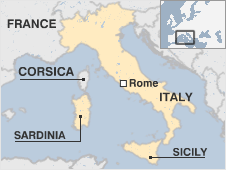 |
Take the art works of Botticelli Leonardo da Vinci Michelangelo
Tintoretto and Caravaggio the operas of Verdi and Puccini the cinema of Federico Fellini add the architecture of Venice Florence and Rome and
you have just a fraction of Italy's treasures from over the centuries.
While the country is renowned for these and other delights it is also notorious for its precarious political life and has had several dozen governments since the end of World War II.
Overview
The Italian political landscape underwent a seismic shift in the 1990s when the "Clean Hands" operation exposed corruption at the highest levels of politics and big business. Several former prime ministers were implicated and thousands of businessmen and politicians were investigated.
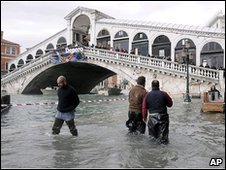
Venice: The city built on islets has been sinking
|
Italy was one of the six countries which signed the 1951 Paris Treaty setting Europe off on the path to integration. It has been staunchly at the heart of Europe ever since although in the early 2000s the government of Silvio Berlusconi adopted a more Eurosceptic stance.
Mr Berlusconi sought to align Italy more closely to the US breaking ranks with the country's traditional allies France and Germany in his support for the US-led campaign in Iraq.
The Europhile Romano Prodi who was prime minister from 2006 to 2008 pulled the Italian troops out of Iraq and set about restoring good relations with other EU member states.
Italy is the fourth largest European economy and for long enjoyed one of the highest per capita incomes in Europe despite the decline in traditional industries such as textiles and car manufacturing as a result of globalisation.
But it became one of the first eurozone victims of the global financial crisis of 2008. By the autumn the economy was declared to have fallen into its fourth recession in less than a decade.
There is concern over Italy's birth rate - the lowest in Europe - and the economic implications of an ageing population. With the population forecast to fall significantly over the next 50 years the late Pope John Paul II instructed Italians to "rediscover the culture of life and love and... their mission as parents".
Facts
- Full name: Italian Republic
- Population: 60 million (UN 2009)
- Capital: Rome
- Area: 301338 sq km (116346 sq miles)
- Major language: Italian
- Major religion: Christianity
- Life expectancy: 78 years (men) 84 years (women) (UN)
- Monetary unit: 1 euro = 100 cents
- Main exports: Machinery and transport equipment chemicals clothes wine
- GNI per capita: US $35240 (World Bank 2008)
- Internet domain: .it
- International dialling code: +39
Leaders
President: Giorgio Napolitano
Giorgio Napolitano veteran politician was sworn in as Italy's 11th post-war president in May 2006.
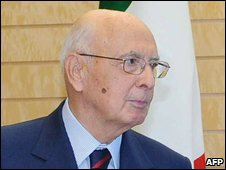
Giorgio Napolitano
|
The former member of the Italian Communist Party was among the leading architects of the party's transformation into a social-democratic movement.
The Italian president heads the armed forces and has powers to veto legislation disband parliament and call elections.
He played a key role in a fierce right-to-die debate in 2009 by refusing to sign an emergency government decree ordering doctors to resume feeding a woman who had been in a coma for 17 years.
Prime minister: Silvio Berlusconi
Silvio Berlusconi began his third term as prime minister of Italy in May 2008 heading a centre-right coalition including his own Forza Italia party.
The dominant figure on the right since 1994 when he first moved directly into politics Mr Berlusconi built a business empire out of construction and media interests in his native Milan.
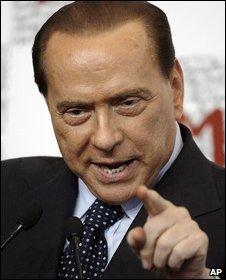
Three-times premier Silvio Berlusconi
|
He is one of Italy's wealthiest men and owns three of the country's seven television channels and several leading newspapers. He also has interests in banking and insurance and owns the AC Milan football team.
Mr Berlusconi launched his political career during the corruption inquiries of 1994 which paralysed the established parties.
His brand of populism and can-do image heavily promoted through his media empire made his new Forza Italia ("Let's go Italy!") party the largest in the new parliament and he headed a fractious right-wing coalition that fell after a few months.
He used the period in opposition to reorganise Forza Italia along more traditional party lines and won the 2001 elections at the head of a broader centre-right coalition with a commitment to simplify the tax system and halve unemployment. He also aligned Italy more closely with the United States on foreign policy including support for the invasion of Iraq in 2003.
The government was not able to meet its economic targets and narrowly lost power in 2006.
His business contacts and media role have led to accusations of conflict of
interest especially over legislation seen as protecting his commercial
interests. Mr Berlusconi has been put on trial at least six times over financial matters. Although found guilty on three occasions he was later acquitted or
benefited from the expiry of the statute of limitations.
His legal troubles took a surprise turn in October 2009 when the constitutional court overturned a law granting him immunity while in office. The ruling meant he could face trial in at least two court cases including one accusing him of corruption. The law was pushed through by Berlusconi's coalition in 2008 when he faced separate trials in Milan for corruption and tax fraud tied to his Mediaset broadcasting empire.
The proceedings against Berlusconi who denies all charges were suspended as a result of the law drawing accusations that it was tailor-made for him.
The financial crisis of 2008 led to a boost in Mr Berlusconi's popularity ratings. He took steps to inject money into troubled banks and high-profile businesses and his ability to rule by decree when necessary seems to have reassured at least some voters.
In 2009 Mr Berlusconi came under pressure from the centre-left opposition over a series of allegations about his sex life including allegedly spending a night with an escort and the publication of pictures of topless women at his residence.
In March his wife of 19 years Veronica Laro said she would file for divorce accusing him of "consorting with minors" after he attended a female friend's 18th birthday party. He says all the allegations are wrong or exaggerated.
Media
Italy's heady blend of politics and media has made headlines inside and outside the country with watchdogs and some politicians pointing to Prime Minister Berlusconi's influence over both public and private broadcasting.
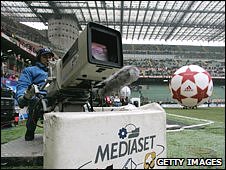 The Berlusconi family has a major stake in TV giant Mediaset
|
The public broadcaster Rai has traditionally been subject to political influence and Mr Berlusconi's Mediaset empire operates Italy's top private TV stations.
Between them Rai and Mediaset effectively control Italy's TV market and are a potentially powerful political tool.
A media law passed in 2004 heralded the creation of new digital TV channels and the partial privatisation of Rai. Critics said the bill reinforced Mr Berlusconi's hold on the media.
The Italian press is highly-regionalised. Milan in particular is home to many dailies and news magazines. Most newspapers are privately-owned often linked to a political party or run by a large media group.
Rupert Murdoch's News Corp secured a virtual monopoly of the pay-TV sector when it launched Sky Italia in July 2003. The service was created through the merger of existing pay-TVs Stream and Telepiu.
Around 2500 commercial radio stations broadcast in Italy. A few of them have national coverage; most are music-based. They share the airwaves with public broadcaster Rai's radio stations.
The press
- Corriere della Sera - Milan-based major daily
- La Repubblica - Rome-based daily owned by L'Espresso group
- Il Messaggero - Rome-based daily
- La Stampa - Turin-based daily owned by Fiat group
- Il Sole 24 Ore - Milan-based financial daily
Television
- Rai - public stations include Rai Uno Rai Due Rai Tre rolling news channel Rai News 24 and cable/satellite services
- Mediaset - main private TV broadcaster operates Italia 1 Rete 4 and Canale 5
Radio
- Rai - public stations include flagship national network Radio 1 entertainment-based Radio 2 cultural station Radio 3 and parliamentary station GR Parlamento
- Radio 24 - commercial network news and business
- R101 - commercial network pop music
- Radio Italia - commercial network Italian pop music
News agency
-
Ansa
AFRICA | ASIA-PACIFIC | AMERICAS | EUROPE | MIDDLEEAST | SOUTHASIA
Mauritania Mauritius Morocco Mozambique Namibia Niger Nigeria Republic-of-congo Rwanda Sao-tome-and-principe Senegal Seychelles Sierra-leone Somalia South-africa Sudan Swaziland Tanzania The-gambia Togo Tunisia Uganda zambia Zimbabwe Australia Brunei Burma Cambodia China East-timor Fiji Indonesia Japan Kazakhstan Kiribati Kyrgyzstan Laos Malaysia Marshall-islands Micronesia Mongolia Nauru New-zealand North-korea Palau Papua-new-guinea Samoa Singapore Solomon-islands South-korea Taiwan Tajikistan Thailand The-philippines Tonga Turkmenistan Tuvalu Uzbekistan Vanuatu Vietnam Antigua-and-barbuda Argentina Bahamas Barbados Belize Bolivia Brazil Canada Chile Colombia Costa-rica Cuba Dominica Dominican-republic Ecuador El-salvador Grenada Guatemala GuyanaHaiti Honduras Jamaica Mexico Nicaragua Panama Paraguay Peru St-kitts-and-nevis St-lucia St-vincent-and-the-grenadines Suriname Trinidad-and-tobago United-states-of-america Uruguay Venezuela Albania Andorra Armenia Austria Azerbaijan Belarus Belgium Bosnia-hercegovina Bulgaria Croatia Cyprus Czech-republic Denmark Estonia Finland France Georgia Germany Greece Hungary Iceland Ireland Italy Latvia Liechtenstein Lithuania Luxembourg Macedonia Malta Moldova Monaco Montenegro Norway Poland Portugal Russia San-marino Serbia Slovakia Slovenia Spain Sweden Switzerland The-netherlands Turkey Ukraine United-kingdom Vatican Algeria Egypt Iran Iraq Israel-and-palestinian-territories Jordan Kuwait Lebanon Libya Mauritania Oman Saudi-arabia Sudan Syria Tunisia United-arab-emirates Yemen Afghanistan Bangladesh Bhutan India Nepal Pakistan Sri-Lanka The-Maldives

